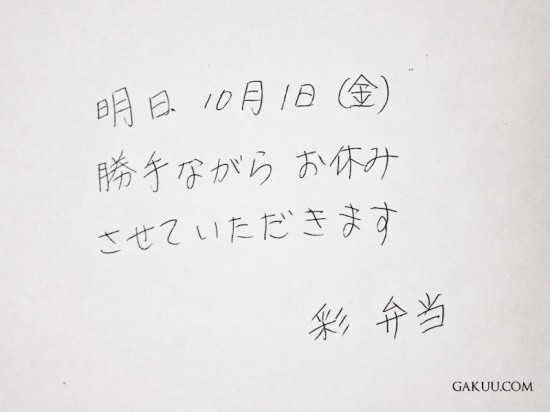Here’s a nice little piece of grammar that you can use instantly to convey a polite message. How to write a note telling someone you’re taking the day off with Katte Nagara (勝手ながら).
Written out then:
明日、10月1日(金)。勝手ながらお休みさせていただきます。
(In hiragana: あした、じゅうがつ ついたち(きん)。かってながら おやすみ させていただきます。)
明日、10月1日(金)。
The first part of this note is dead easy: Tomorrow on 1st October (Friday).
The second part is the really interesting chunk in terms of grammar and keigo (polite language). The grammar here is
勝手ながら
勝手ながら is something of a fixed expression which, depending on the context, can translate to something like ‘doing without asking’ or ‘taking the liberty to do’. It also carries the feeling of being selfish or uncooperative, which is important in this case as explained further below.
お休みさせていただきます。
Roughly translated: ‘We will take a holiday’. The させていただきます here is the polite keigo form of the verb する, to do. We could also write it as: お休みします, or the more regular form, simply 休みます when keigo is not needed. Thinking in literal terms, it might sound something like this:
‘I will receive you letting me take a holiday’.
させる is ‘to let’ or ‘to make’ – the causative form of する. いただく is the polite form of もらう – ‘to receive’. Be careful though – when using させていただく on its own, the effect can be very strong. It has a sort of final edge to it, like ‘I will do this and there’s no changing my mind’. It can sound almost selfish at times, so it’s best used in conjunction with other softening words. In this case that such word is 勝手ながら.
In this note however, the the message is written by a company called 彩 弁当 (Aya Bento) that makes packed lunches. They are announcing that they will take an day off on 1st October. They usually work on this day so adding the 勝手ながら is important here because it neutralises the otherwise forceful effect of させていただく – ‘we are selfishly taking a holiday without prior warning’.
When we put it altogether and clean things up, a translation might look something like this:
We apologise for the inconvenience, but will be taking the day off on Friday 1st October.
Notice how, although no apologies are specifically mentioned, it is included in the phrase because of the keigo and special words chosen. Here’s another dictionary example for reference:
誠に勝手ながら今月末もって閉業させていただきます。 We sincerely apologise for any inconvenience it may cause, but we will cease business at the end of this month.
********************
If you have any questions, feel free to ask in the comments :).

Leave a Reply